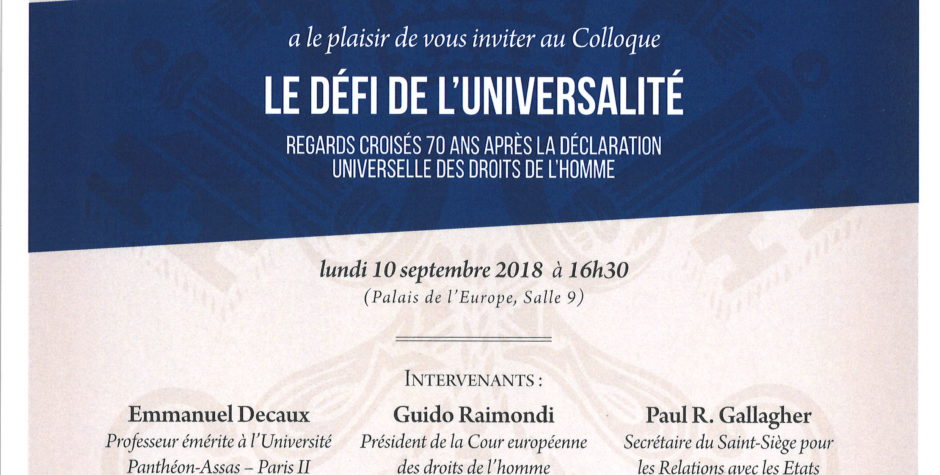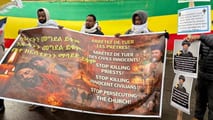

The Challenge of Universality of Human Rights 70 years after the Universal Declaration
The Universality of Human Rights
The challenge of universality
Crossed perspectives 70 years after the Universal Declaration of Human Rights
Council of Europe, Strasbourg, 10 September 2018
Symposium organized by the Permanent Mission of the Holy See to the Council of Europe,
in collaboration with the International Catholic Child Bureau (BICE) and
the European Center for Law and Justice (ECLJ).
With the participation of
IMgr Paolo Rudelli, Permanent Representative of the Holy See to the Council of Europe
IMrs Alessandra Aula, General secretary of the BICE
| |
I Professor Emmanuel Decaux, Professor Emeritus at the University Panthéon-Assas - Paris II, member of the Committee of enforced disappearances (UN)
| |
| IMr Guido Raimondi, President of the European Court of Human Rights
|
IH.E. Mgr Paul R. Gallagher, Secretary of the Holy-See for the Relations with States Télécharger le texte (anglais)
IPresentation The universality of Human Rights is the confirmation of their truth. It seems self-evident as the unity of humanity seems obvious. It brings the aspiration of humanity to its own unity and justice. Yet, however high it may be, the ideal of the universality of Human Rights has always been confronted with serious obstacles. Already, in 1945, the affirmation of “fundamental Human Rights” was described by the United Nations Charter as a “faith”. In 1948, in a politically divided world, René Cassin’s request to qualify the future International Declaration of Human Rights as universal clashed with the ideological differences of its writers. In order to win the assent of all, the Universal Declaration must have omitted to specify the ultimate basis of its own universality. It has become universal in fact, by the global membership of which it has benefited. While the legal order is itself experiencing globalization and while Human Rights protection instruments are multiplying, paradoxically, the universality of Human Rights is once again weakened. Increasingly, one can witness divergent interpretations of Human Rights: there is a growing gap between the liberal interpretation on the one hand, tending towards individualist radicalism which is moving away from the founding treaties, and the positions of different groups or countries, claiming the protection of their cultural identity. Thus, Human Rights seem to be progressively altered by ideologies, even though they were designed after the war to protect people. The possible way out of this crisis necessarily involves the reappropriation, in this new context, of the doctrine of the universality of Human Rights.
+ + + This conference is organized on the occasion of the 70th anniversary of the Universal Declaration of Human Rights. It will be followed by another conference on the “dignity of life”, organized on 3 December 2018 by the Permanent Mission of the Holy See to the United Nations in Geneva, followed by a symposium in the Vatican on 10 December 2018.
|











